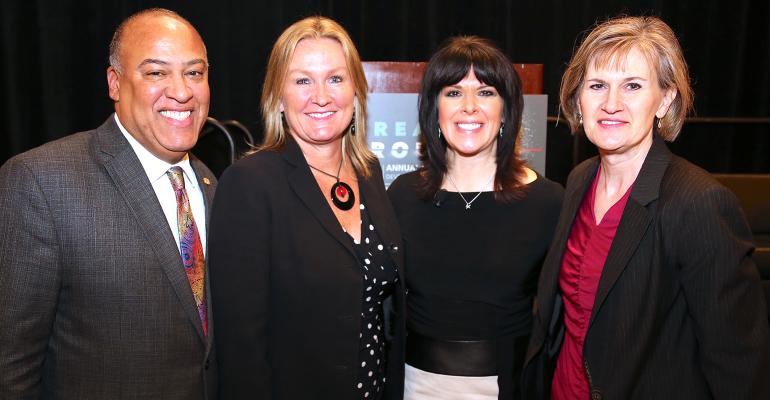Female foodservice executives are pledging to reach gender equity in restaurant industry leadership by 2025, and several charted their paths toward that goal in an opening session Sunday at the Women’s Foodservice Forum annual conference.
“We are in unprecedented times of mistrust,” said Kelli Valade, president of Dallas-based Brinker International Inc.’s 1,680-unit Chili’s Grill & Bar division and moderator of the “Leading the Way to Gender Equity” panel. She urged attendees to “lead with trust and encourage others to do the same.”
The WFF is bringing together more than 3,000 foodservice leaders through Wednesday at the Hilton Anatole Hotel in Dallas.
The gender equity panelists also included: Gerry Fernandez, founder and president of the Multicultural Foodservice & Hospitality Alliance; Tim Johnson, the WFF’s senior director of human resources; Sarah King, chief human resources office for Orlando, Fla.-based Darden Restaurants Inc.; and Julie Sexton, vice president of talent management at Land O’Lakes.
Valade said the WFF’s “bold” initiative is to make the foodservice industry the first to create gender equity by the year 2025.
Valade said the WFF is working with the McKinsey & Co. and the women’s executive advocacy group Lean In to increase the number of female executives in the restaurant industry beyond the current 20 percent and to increase their numbers in finance roles as well.
Johnson said the organization plans 12 leadership workshops in the fall to focus on leadership capabilities and career development.
“Two years ago in McKinsey’s ‘Women in the Workplace Study,’ they said at the current pace it would take companies 100 years for women to reach parity,” Johnson said. “I don’t have 100 years; you don’t have 100 years. The only way we are going to get there is gathering insights and data and building specific plans to get there.”
WFF is looking to expand the number of restaurant companies participating in the McKinsey study to 100, Johnson said. Currently, 32 food industry companies are participating, including Brinker, McDonald’s Corp., Red Robin Gourmet Burgers Inc. and Yum Brands Inc.
King of Darden, which owns Olive Garden and LongHorn Steakhouse among other casual-dining brands, said companies need executive suites that lead the way in planning out and nurturing a gender-inclusive culture.
“It’s important for organizations to spend time, if they don’t already have a core set of values, to think about the values that drive an environment that makes people feel like they are appreciated and included,” she said, adding that those values must make very clear that “bad behavior is not tolerated.”
A culture that emphasizes diversity and gender party is especially important for recruitment in a labor market when unemployment remains, she said.
“The next generation of employees in a lot of industries is looking specifically for those organizations that practice the values they preach,” King said.
Corporations also must make sure the “people that you are hiring, promoting, developing, recognizing and rewarding are reflective of the organizations values,” she said.
Once leadership and culture are aligned, companies must make their policies clear, King said.
“You don’t want the first time you hear about issues to be when you get a call from an outside attorney. There need to be outlets in the organization for employees to raise their concerns.”
King said that if employees don’t feel comfortable talking to their direct report, the company should offer other options to report concerns, such as an anonymous ethics email address, a hotline and general communication of an open-door policy.
Sexton of Land O’Lakes said her organization’s Winfield division has improved its pipeline of gender-diverse talent by meeting with corporate leaders and then creating an internship program.
The internship program is a “robust, resume-building” program, Sexton said, which serves as a feeder platform for the Winfield Associates two-year “New Grad Rotation Program.”
Participants in that program, which started in 2009, are hired directly out of undergraduate programs and do rotations in key departments like sales, marketing, research and development and agronomy and then a year with a cooperative member-owner.
“They are right in the thick of the business,” Sexton said. The program has increased the number of women in leadership positions from 9 percent at the start of the program in 2009 to 20 percent at the end of 2017, she said.
“We continue on this journey,” Sexton said, making sure the company is looking at data in promotions, hires and turnover.
Companies need to compile benchmark data and maintain a report card on diversity efforts, said King of Darden. “What gets measured gets done,” she said.
King added that corporate cultures can reinforce good practices and behaviors through rewards such as promotions.
“Actions speak louder than words,” she added.
Fernandez of the MFHA noted that all companies “need to be proactive about engaging people of difference” and much more work remains to be done.
“We need to energize communities to create a pipeline” of talent, Fernandez said. “We all have some work to do.”
Contact Ron Ruggless at [email protected]
Follow him on Twitter: @RonRuggless





